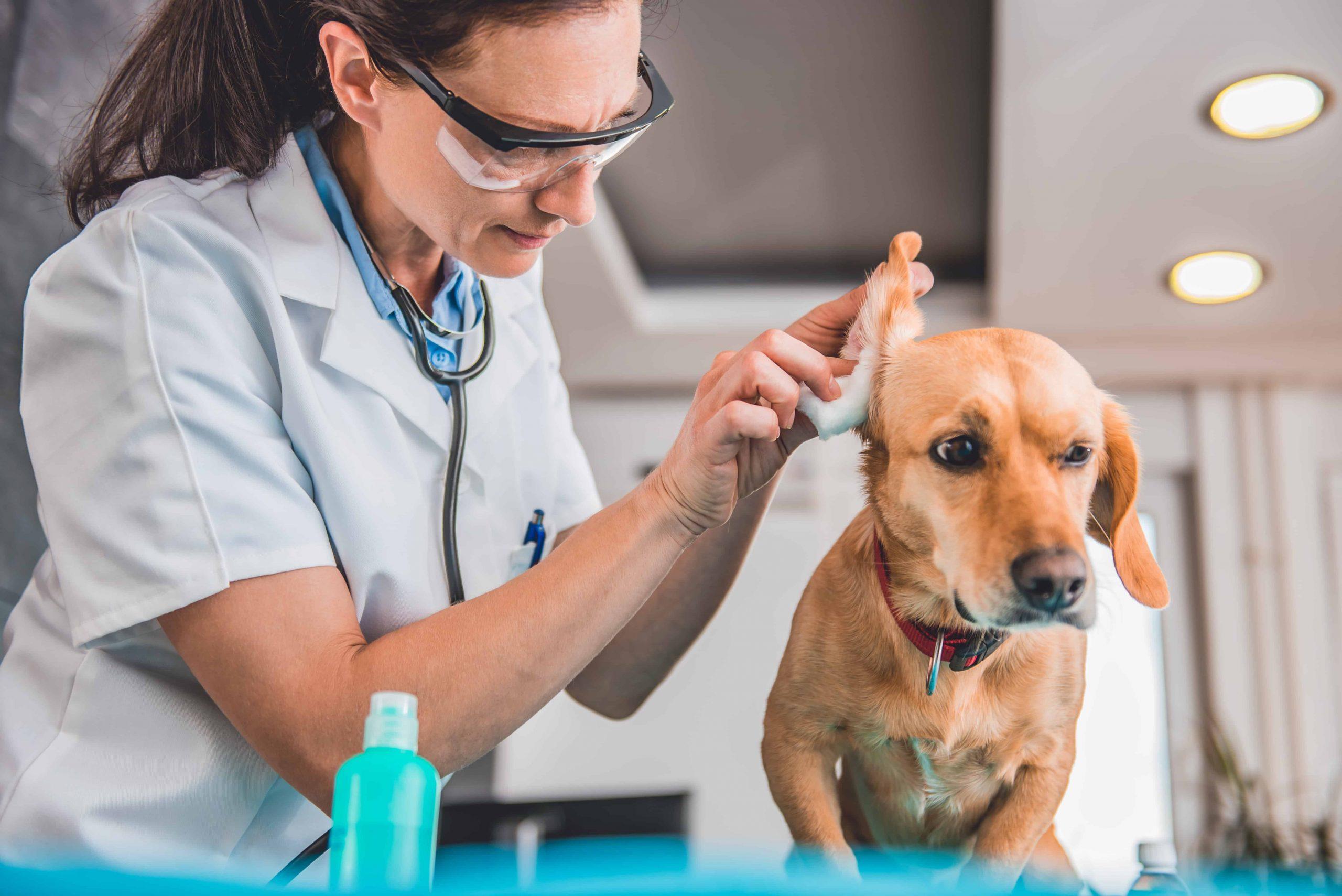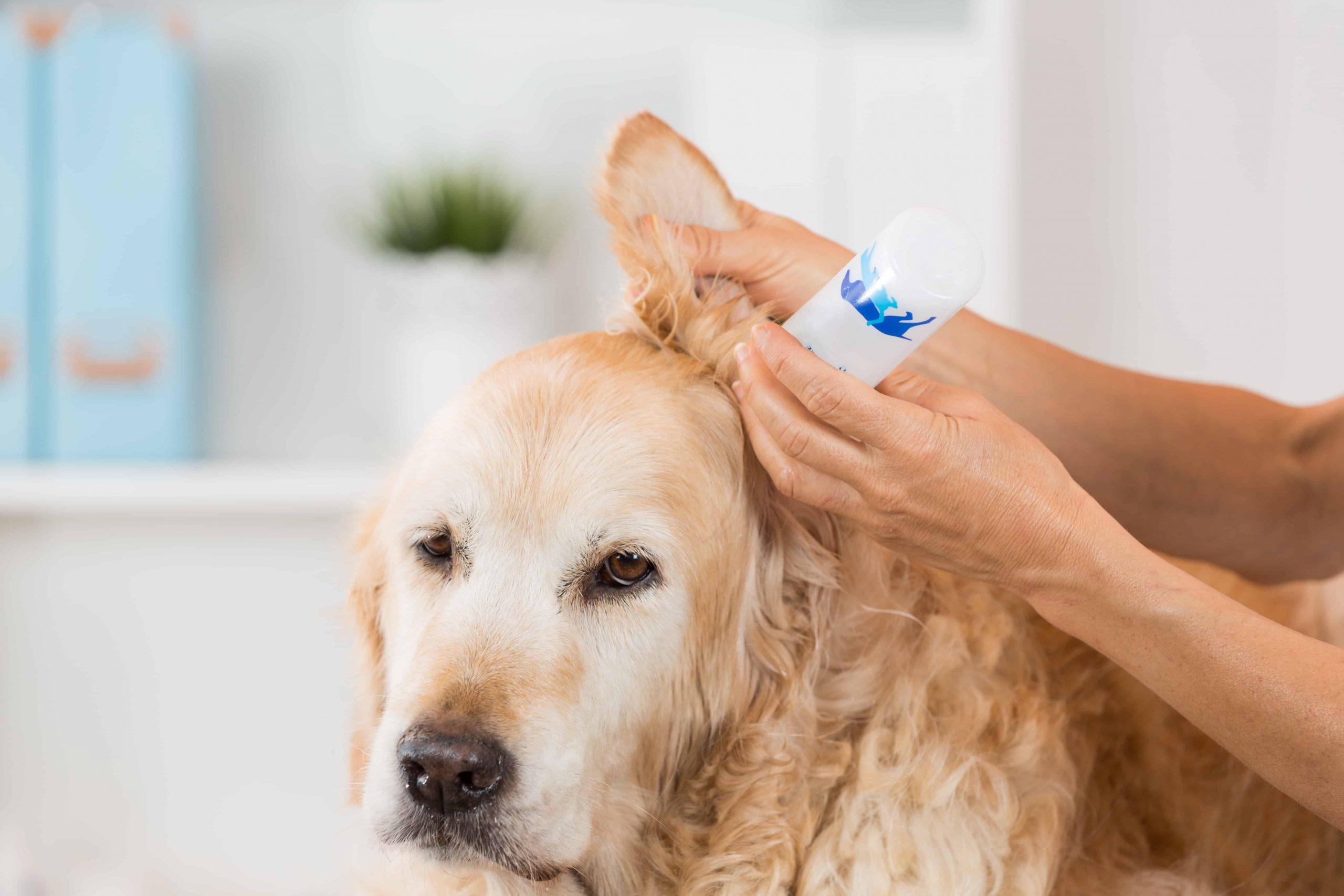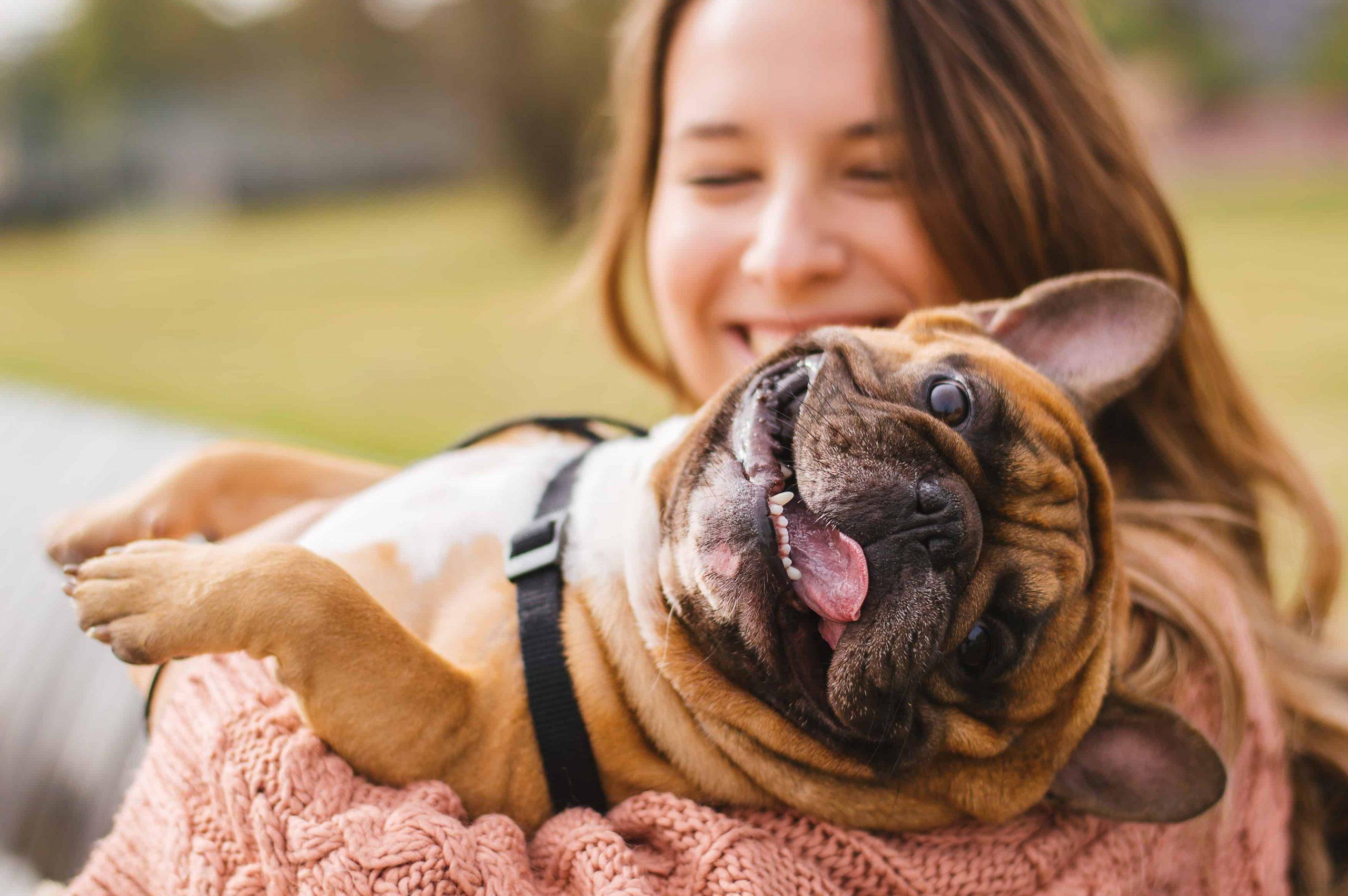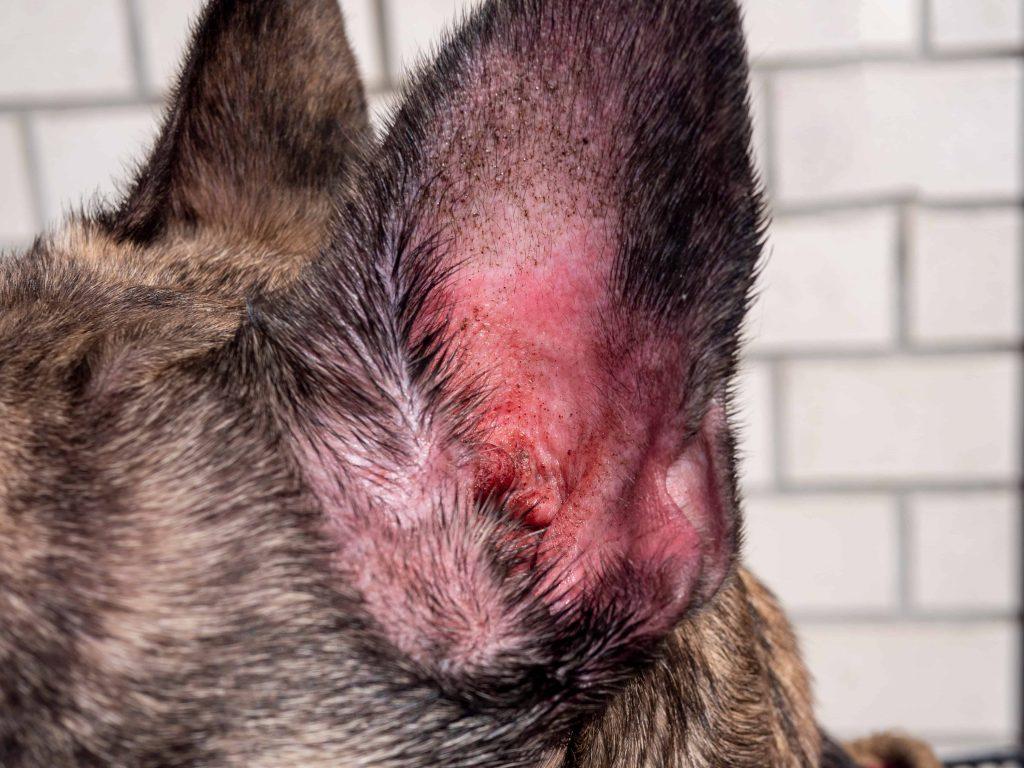If you’ve ever had a stubborn itch in your ear, you can relate to how your barking pal feels when struck down by otitis externa – a very painful condition for humans and dogs alike!
What is otitis externa in dogs?
This outer ear infection is one of the biggest reasons why “pawrents” take their pooch to the vet.
Otitis externa in dogs occurs when the external ear canal becomes inflamed or infected, typically with bacteria, yeast or allergens. It’s so irritating that your pooch may shake her head excessively or even scratch at the affected area until it bleeds.
Please seek veterinary advice as soon as possible:
Acute and uncomplicated cases are fairly easy to treat successfully.
However, left untreated, the condition can become chronic or recurrent.
Not only are chronic cases more difficult to treat, they can also lead to secondary infections and even cause irreversible damage to the ear canal. Medication is sometimes useless against secondary infection, so we want to avoid that fate at all costs.
We’re going to talk more about the treatment of otitis externa in dogs, but first, let’s explore the symptoms and causes.
Otitis externa in dogs (symptoms)
- Red ear
- Swollen ear
- Discharge from the ear (brown and waxy)
- Unpleasant odour
- Skin rash in the area
- Ulcers on the lobe
- Inflammation of the glands
- Painful ear that’s hot to touch
- Frequently shaking head
- Rubbing ears against objects
- Scratching ears
- Excessive licking
The most obvious symptom is visible pain when you touch your dog’s ear.
Please remember:
Untreated symptoms can progress to irreversible end-stage ear disease. This can cause permanent hearing loss and in extreme cases, the infected ear canal may need to be surgically removed.

What is otitis externa in dogs caused by?
There are many different factors behind canine otitis externa. Successful treatment depends on what’s causing the problem, which your vet will identify.
Possible causes include:
- Bacterial infection (commonly: Enterococcus, Pseudomonas, Corynebacterium, Proteus, Streptococcus, and Corynebacterium)
- Fungal infection (especially Malassezia yeast)
- Viral infection
- Allergies (including food reactions)
- Disease of the endocrine or autoimmune system
- Excessive cleaning of the area
- Negative reaction to particular medications
What increases the risk of otitis externa in dogs?
- Exposure to parasites
- Foreign objects contaminating the ear
- Water trapped in the ear (especially after swimming or bathing)
- Compromised immunity
- Allergies
Are particular breeds more susceptible to otitis externa in dogs?
Yes.
If your dog wears his floppy ears like a fashion statement, then he or she is more vulnerable to developing the condition. Although any breed can develop canine otitis externa, it’s more common in breeds with big droopy lobes (such as basset hounds, cocker spaniels and beagles).
Is canine otitis externa contagious to humans and other animals?
In most cases, no, canine ear infections usually aren’t contagious and won’t spread to humans or other animals (unless a contaminated parasite transfers the infection from one host to another).
Diagnosing canine otitis externa
Your vet will examine your four-legged friend to find out exactly what’s causing otitis externa. Sedation is sometimes needed for an otoscope to probe deeper inside the ear – especially if there’s suspicion that foreign objects or impacted debris are trapped inside. During this process, ear tissue is collected so that problematic microbes can be identified.
In other cases, a simple swab with a cotton-tipped tool is enough to give your vet all the information they need for an accurate diagnosis of the external ear canal.
The answer isn’t always clear, so further tests may be required (such as allergy testing, X-rays, ringworm tests and even biopsies for severe cases).

Treatment of otitis externa in dogs
Veterinarians normally recommend medicated treatments as the first plan of attack – the exact type depends on what’s causing the problem. Examples include topical or oral antibiotics, antimicrobials, pain relievers, or anti-inflammatory drugs.
It’s common for vets to clean the ear gently before administering any medication. This can be very painful for severe cases and sometimes requires anaesthesia to sedate your pup or numb the pain.
Surgery may be required for more complicated cases.
Important note:
Please don’t ever use your own medications on your pup, as dogs respond differently to the chemicals in oral and topical medications (including ear drops). Also, check with your vet before administering any pet medications that you’ve used in the past.
Just as importantly:
We know it can be tempting to try home remedies like vinegar dilutions too, but this can actually cause more harm than good by further irritating the lining of the canal or drying out the skin.
How long does it take for otitis externa in dogs to heal?
Full recovery usually takes up to a month, but expect a longer timeframe for severe cases.

How to prevent canine otitis externa
Clean your dog’s ears after baths or swimming:
Bacteria is drawn to warm areas, like your dog’s inner ear – especially if there’s water trapped there. Clean your pup’s ears regularly after bathing or swimming but don’t use Q-tips or anything that could push debris into the canal.
A gentle approach to ear cleaning normally involves cotton balls and a saline eye solution. But don’t take our word for it – please ask your veterinarian about the best way to clean your dog’s ears, as you could cause damage by doing it incorrectly.
It’s also a good idea to wipe your dog’s facial folds and underbelly area – to stop opportunistic bacteria from traveling down into the sensitive ear canal.
If your dog has any allergies, take this seriously:
We recommend feeding your pooch a diet rich in vitamins, minerals and nutrients to help protect their immune system. Make sure the food doesn’t contain additives and allergens, which can set off allergies that trigger otitis externa.
If you suspect a food allergy, speak to your vet, who will conduct suitable tests and may even suggest you conduct a food elimination trial. Vets usually recommend a hypoallergenic diet that’s tailored to the specific allergy (if one is present). Don’t stray from this diet!
Banish parasites:
We know that parasites are a big culprit behind canine otitis externa, so do everything in your power to keep them away from your beloved pup.
This involves administering regular flea and tick medication, and making your house a hostile environment for parasites. For more information, read our article about preventing parasites in cats (the same advice applies for dogs).

Potiki dog insurance for canine otitis externa
In Australia, it can cost between $160 and $200 to treat a mild ear infection, but severe cases are more expensive.
Pawrents with reliable pet insurance don’t have to scrimp and save to pay for vet bills, as most of the fees are covered by their policy (as long as it’s not a pre-existing condition).
Potiki’s affordable pet insurance gives you that peace of mind, but we go one step further….
We also send you free Potiki Perks to help prevent your best pal from getting sick in the first place.
All customers get access to Potiki Perks#. Potiki Perks# comes with the free Potiki Perks app offering exclusive offers, 2-for-1 deals, and up to 20% off in categories like dining, activities, shopping, travel, and more. You will also have access to myPetPass™** which unlocks extra support and savings on everyday pet essentials such as online vet care, discounted pet prescription medication and savings on premium pet food.
This is on top of reliable pet cover that pays for 80 per cent of your eligible vet bills for unexpected illness and injury.
- Get a quick Potiki quote to find out what your premium will cost for one year.
- Submit payment if you’re satisfied with that amount (email us on [email protected] with any questions).
- Log into your personal portal to select items for your Potiki Perks package, which will be swiftly delivered to you.
- Lodge a claim if you need help paying vet bills for unexpected sickness or injury.


